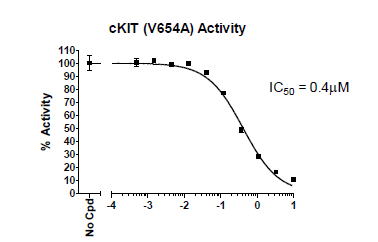cKIT (V654A) Assay Kit
The cKIT (V654A) Assay Kit is designed to measure cKIT (V654A) activity for screening and profiling applications using ADP-Glo® Kinase Assay as a detection reagent.
Need us to run inhibitor screens or profile your compounds against cKIT (V654A)? Check out our Kinase Screening Services.
ADP-Glo® Kinase Assay (Promega #V6930)
Dithiothreitol (DTT, 1 M; optional)
Microplate reader capable of reading luminescence
Adjustable micropipettor and sterile tips
30°C incubator
| Catalog Number |
Reagent |
Amount |
Storage |
|
| 40251 | cKIT(V654A), His-Tag | 10 µg | -80°C |
|
| 79334 | 5x Kinase assay buffer I | 1.5 ml | -20°C | |
| 79686 | ATP (500 μM) | 50 µl | -20°C | |
| 40217 | Protein Tyrosine Kinase Substrate (Poly-Glu,Tyr 4:1) (10 mg/ml) |
50 µl | -20°C | |
| 79696 | 96-well plate, white | 1 | Room Temp. | |
c‐KIT is a proto‐oncogene and a type III transmembrane receptor for mast cell growth factor, also known as stem cell factor. It plays an essential role in the regulation of cell survival and proliferation, as well as hematopoiesis, stem cell maintenance, gametogenesis, melanogenesis, and mast cell development, migration and function. Activating mutations in cKIT are associated with gastrointestinal stromal tumors (GIST), testicular seminoma, mast cell disease, melanoma, and acute myeloid leukemia, while inactivating mutations are associated with the genetic defect piebaldism. Secondary point mutation V654A, a commonly acquired mutation within the cKIT ATP-binding pocket of the kinase domain, has been found in patients with GIST undergoing treatment with Imatinib. The V654A mutation is strongly correlated with Imatinib resistance and rapid progression of GISTs.
1. Schumaker, J.A., et al. (2008) J. Clin. Pathol. 61:109-114.
2. Sun, J. et al. (2009) J. Biol. Chem. 284: 11039-11047.


